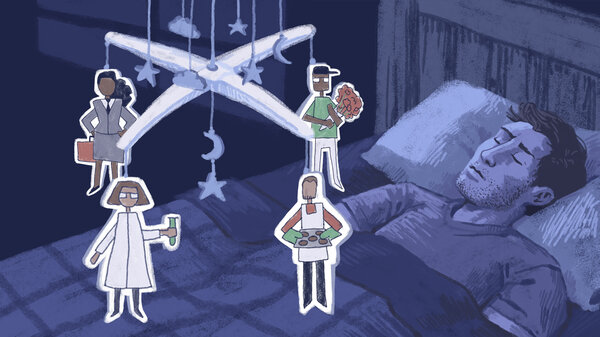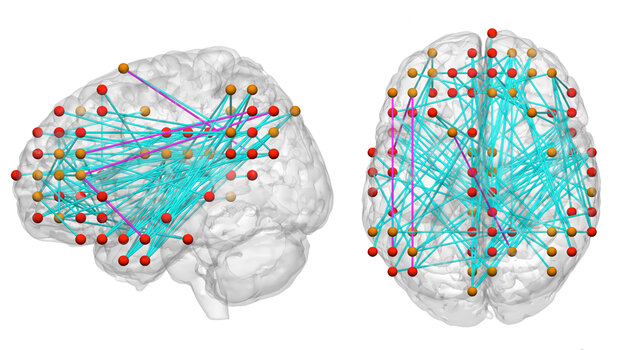|
|
|
 Doug Griswold/Bay Area News Group/MCT via Getty Images Doug Griswold/Bay Area News Group/MCT via Getty Images
Users of an app developed by the University of Michigan to help with jet lag entered information on their time zone and sleep patterns that helped academics with their work. But is the approach valid? The analysis of the data was published in the journal Science Advances, but critics worry that using data generated via smartphones might not be a representative sample.
Read more at NPR.org.
 iStockphoto iStockphoto
A recent study published in the journal Neurology found eighteen months after a concussion or other traumatic brain injury, two-thirds of the patients were still sleepy during the day. And most were unaware of their symptoms.
Read more at NPR.org.
 parema/Getty images parema/Getty images
No wonder we don’t feel rested after a first night in a new place: Half of our brain has stayed alert while the other half enjoyed deeper sleep, a study published in Current Biology finds. We really have been half-asleep.
Read more at NPR.org.
 Universal Stopping Point Photography/Getty Images Universal Stopping Point Photography/Getty Images
Everyone has a set of genes that keeps the body on a 24-hour rhythm. As we get older, though, the main clock can malfunction, a study published in the journal PNAS finds. Researchers say a backup clock may try to compensate.
Read more at NPR.org.
 Seb Oliver/Getty Images/Cultura RF Seb Oliver/Getty Images/Cultura RF
Successful people get more sleep than you might expect. Are their sleep patterns giving them a leg-up on the average American?
Read more at NPR.org.
 Dibyangshu Sarkar/AFP/Getty Images Dibyangshu Sarkar/AFP/Getty Images
What if you could never get a good night’s rest? Researchers are investigating whether sleep deprivation can keep people trapped in poverty.
Read more at NPR.org.
 Hayato D./Flickr Hayato D./Flickr
Late-night coffee, tea or cola does more than keep you up, scientists say. The amount of caffeine in a double espresso can delay the internal clock in cells throughout your body by about 40 minutes, according to a study published in the journal Science Translational Medicine.
Read more at NPR.org.
 M. Scott Brauer for NPR M. Scott Brauer for NPR
A lack of sleep can increase the risk of traffic accidents, heart attacks, diabetes and maybe even Alzheimer’s disease, research suggests. Yet most people with sleep disorders don’t get treatment.
Read more at NPR.org.
 iStockphoto iStockphoto
Last year the nation’s pediatricians said middle and high schoolers shouldn’t start school before 8:30 a.m., so they can get much-needed sleep. But almost all schools start before that, the CDC finds.
Read more at NPR.org.
 Mary McLain/NPR Mary McLain/NPR
You are probably at least a little bit racist and sexist and homophobic. Most of us are. And before you get offended, try taking one of the popular Implicit Association Tests. They measure people’s unconscious prejudice. These tests find that most people trust men or women, white people over minorities, and straight people over queer people.
So, what are we to do? Scientists are working on ways to train our brains away from deeply held prejudices — including hacking your subconscious while you sleep. Yes, it sounds like a scam, but the results, published in the journal Science, show that it’s possible.
Read more at NPR.org.
 Karramba Production/Shutterstock Karramba Production/Shutterstock
Have you ever struggled to finish a level of Candy Crush or complete a Sudoku puzzle in the evening but breezed through it the following morning? The reason may please anyone who’s been told they spend too much time in bed asleep. A new study suggests that ‘sleeping on it’ can improve problem solving.
Read more at iflscience.com.
 Simone Golob/Corbis Simone Golob/Corbis
Why do screams demand our attention like no other sound? The answer seems to involve an acoustic quality called roughness that triggers fear circuits in the brain.
Read more at NPR.org.
 Ikon Images/Corbis Ikon Images/Corbis
A review of the medical evidence finds that therapy can break the cycle of chronic sleeplessness by addressing the anxieties that cause many people to stay awake.
Read more at NPR.org.
 Courtesy of Lully Courtesy of Lully
A startup has developed a method the firm says will put to bed kids’ night terrors, a sleep disorder that can impact a family’s quality of life. The device uses app-controlled timed vibrations that rouse a child into a lighter sleep stage and prevent night terrors, which occur during deep non-REM sleep.
Read more at NPR.org.
 James Duncan Davidson/TED James Duncan Davidson/TED
What do we know about one of our most basic needs: sleep? Not a lot, says circadian neuroscientist Russell Foster. We know we need to do it to stay alive, but much about it remains a mystery.
Read more at NPR.org.
 Rob Stapleton/AP Rob Stapleton/AP
Mega-disasters like Chernobyl and the Exxon Valdez oil spill were set off by people who were sleep-deprived. Researchers say they’re able to pinpoint how lack of sleep derails decision-making.
Read more at NPR.org.
 Roderick Chen/Getty Images Roderick Chen/Getty Images
Hospitals are notoriously difficult places to sleep, despite efforts to make them less noisy. Cheap, simple workarounds can help, a study finds. Taking the sleep hormone, melatonin, helped the most.
Read more at NPR.org.
 Credit: Katherine Streeter for NPR Credit: Katherine Streeter for NPR
We have different clocks in virtually every organ of our bodies. But living against the clock — eating late at night or working overnight — may set the stage for weight gain and chronic disease.
Read more at NPR.org.

Where there’s pot, there’s often an insatiable hunger. A new study gives a clue why: Cannabinoids, the drug in marijuana, appear to flip a neural circuit that normally tells us we’re full into thinking we’re hungry.
Read more at NPR.org.

A new study suggests using an e-reader before trying to nod off may disrupt sleep more than reading a paper book. Scientists suspect the screen’s blue light is messing with the sleep-inducing hormone, melatonin.
Read more at NPR.org.

Missing out on sleep can lead to more than grumpiness. Teenagers who aren’t getting enough sleep are also more apt to binge drink, a study finds, even years later.
Read more at NPR.org.

New research suggests that the neural network that controls attention may develop more slowly in children who have attention deficit hyperactivity disorder (ADHD). While previous research suggested that the brains of children with ADHD develop more slowly, this new research was able to detect changes in connectivity within and between key brain regions.
Read more about the research at NRP.org.
Scientists still debate the exact function of sleep, with some arguing that it aids our memory, while others argue that it helps to conserve energy, and still other argue that it is needed to discharge our emotions. A new study published in Science presents data suggesting that during sleep harmful toxins are cleared from our brains, which might prevent diseases like Alzheimer’s. Read more at NPR’s coverage: Brains Sweep Themselves Clean of Toxins During Sleep
|
|
 Doug Griswold/Bay Area News Group/MCT via Getty Images
Doug Griswold/Bay Area News Group/MCT via Getty Images

 iStockphoto
iStockphoto parema/Getty images
parema/Getty images Universal Stopping Point Photography/Getty Images
Universal Stopping Point Photography/Getty Images Seb Oliver/Getty Images/Cultura RF
Seb Oliver/Getty Images/Cultura RF Dibyangshu Sarkar/AFP/Getty Images
Dibyangshu Sarkar/AFP/Getty Images Hayato D./Flickr
Hayato D./Flickr M. Scott Brauer for NPR
M. Scott Brauer for NPR iStockphoto
iStockphoto Mary McLain/NPR
Mary McLain/NPR Karramba Production/Shutterstock
Karramba Production/Shutterstock Simone Golob/Corbis
Simone Golob/Corbis Ikon Images/Corbis
Ikon Images/Corbis Courtesy of Lully
Courtesy of Lully James Duncan Davidson/TED
James Duncan Davidson/TED Rob Stapleton/AP
Rob Stapleton/AP Roderick Chen/Getty Images
Roderick Chen/Getty Images Credit: Katherine Streeter for NPR
Credit: Katherine Streeter for NPR


